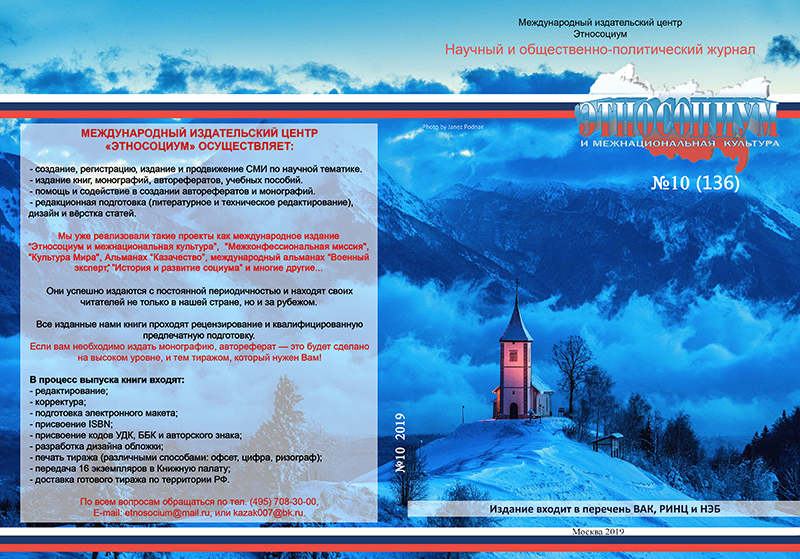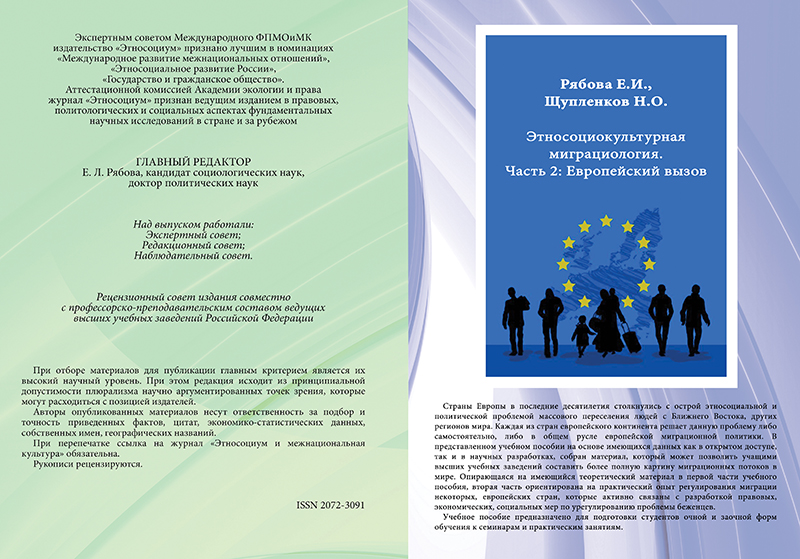

Content
|
COUNCIL OF INTERNATIONAL RELATIONSHIP
|
|
|
Abramov V.L. Foreign policies of the EAEU member states with a "small economy" in the face of geopolitical tensions
|
9
|
|
ACTUAL PROBLEMS OF MODERN SOCIETY
|
|
|
Ermoshkina T.V. Socio-political aspect of the problem of leadership and gender impact on modernity
|
20
|
|
Ternovaya L.O., Ryabova E.I. Civilization antagonism of Russia and the West in the post-truth period
|
31
|
|
REGIONAL STUDY
|
|
|
Dzutsev H.V., Dibirova A.P., Kornienko N.V. Labor and economic life in the Republic of Dagestan. Part I
|
41
|
|
Fadeev P.V. The role of museums of the Khanty-Mansiysk Autonomous Okrug in the formation of visitor identities
|
52
|
|
Dzutsev H.V., Dibirova A.P., Kornienko N.V. Labor and economic life in the Republic of Dagestan. Part II
|
66
|
|
NTERNATIONAL RELATIONSHIPS
|
|
|
Komleva V.V. Humanitarian cooperation in Eurasia: the system of the Eurasian educational space
|
80
|
|
Aksenova E.I. Academic mobility as a factor in the development of international relations in education. Part 2. Academic mobility of University teachers and researchers
|
93
|
|
Chapkin N.S. The history and present of the club form of organization of world politics actors
|
103
|
|
Gao Сhunyu Russian emigrants in Xiao Hong's works
|
110
|
|
ECONOMY OF REGIONS
|
|
|
Zheleznaya A.B. The social types and enneatype in psychodiagnostics
|
116
|
|
Abstracts
|
121
|
|
Authors
|
131
|
|
Requirements to materials submitted to the international publishing house "Etnosocium"
|
133
|
The aim of the article is to analyze the foreign policies of Armenia and Kyrgyzstan as member states of the Eurasian Economic Union (EAEU) with "small economies". Shown are the changes in their foreign policies in connection with membership in the EAEU, as well as under the influence of geopolitical factors. Formulated suggestions and recommendations for the further development of integration processes in the EAEU, taking into account the specifics of member states with a "small economy".
Keywords: foreign policy, EAEU, Eurasian integration, Armenia, Kyrgyzstan, “small economy”, geopolitical tension.
The modern type of society imposes special requirements on actors and institutions for the assimilation and implementation of norms, rules and values. In this regard, a conscious need arises for the transformation of gender impact and roles. This trend manifests itself in a change in the structure of professions, admission to a number of positions of those categories of workers in accordance with gender and age structure that were not previously allowed, etc. The result of gender restructuring of the community is the demarcation of the social structure, as well as a change in the structure of state policy in the field of family, women, children, retirement, educational and medical systems.
In this article, we consider the main foundations of the transfiguration of gender impact on modernity, as well as trace those trends that reflect the structure of the development of the socio-political system in the context of shifting gender roles in relation to economic reality, as well as family structure.
Keywords: gender, family, state policy, social policy, glass ceiling.
The article is the result of the authors' thoughts on the new book of the famous Russian geopolitician Vladimir Stol “Russia and the West: a failed alliance, or confrontation as inevitability”. It provides compelling evidence of futility for more than five centuries to realize attempts to bring Russia and the West closer together. This article analyzes why both sides see each other in the mirrors of mutual distortion.
Keywords: geopolitics, Russia, the West, civilizational identity, security, world wars.
In July 2019, an ethnosociological study was conducted by the staff of the Center for the Study of Border Regions of the Institute for the Study of Cross-Border Regions at the ISPI FISIS RAS on the topic: “Labor and economic life in the Republics of the North-Caucasian Federal District. During a study in the Republic of Dagestan, 200 respondents and 10 experts were interviewed. The experts were scientists - sociologists and demographers, lawyers and civil servants. The following aspects of the labor and economic activities of citizens were investigated: the importance of labor, satisfaction with the level of payment, the ability to realize one’s creative potential, as well as intellectual abilities and labor skills, opportunities for expanding one's professional horizons. The attitude of citizens of the republic to such realities of modernity as the need for the development of new knowledge and skills, self-employment, individual and collective work, an extended working day, and overtime work is investigated. Part of the study concerned the issues of gender stereotype of labor, the degree of women's involvement in the economic life of the republic, the impact of maternal employment on the situation in families. The concept of “labor” was considered from two points of view: both as the main source of replenishment of the family budget, and as a way of social and professional self-realization.
The phenomenon of unemployment is considered separately: to what extent it is prevalent in the region, what measures are preferred by citizens to prevent job loss.
Keywords: physical and intellectual labor, economic activity, temporary work, information technology, financial resources, salary, intelligence, informal economy, development economy, state work, temporary, permanent, fixed salary, intellectual opportunities.
The article presents the results of content analysis and analysis of interviews of four museums in Khanty - the Mansi Autonomous Region (KhMAO). We confirmed the hypothesis that the activities of museums are mainly aim at the formation of identities, in particular, ethnic and regional (of indigenous peoples and Russian).
Keywords: identity, social identity, Khanty-Mansi Autonomous Region museums, interethnic attitudes.
The article considers the systems and subsystems of the Eurasian educational space. Based on an analysis of the institutional foundations of cooperation and the practice of implementing a number of projects, the author comes to the conclusion that there are three educational subsystems formed as part of the integration of the Union State of Russia, Belarus, the CIS, and the SCO. The article examines the emergence of a new educational space in the EAEU associated with the intensification of Eurasian economic integration and the need to train specialists with common professional competencies for the Eurasian labor market. At the same time, the author notes the inconsistency of Eurasian cooperation in the field of higher education, due to the presence of national interests and the competition of national educational systems.
Keywords: international cooperation, humanitarian cooperation, Eurasian space, educational space.
For more than 10 years, Russia has been a full participant in the Bologna process, perhaps the most significant process of international educational integration and internationalization, proclaiming the need for national and international mobility of teachers, researchers and students. With Russia's entry into the Bologna process, academic mobility has become the basis not only for improving the efficiency of individual universities, but also the basis for the global competitiveness of the national educational system in the global, global space.
Keywords: international relations, education, academic mobility, internationalization.
International relations are characterized by a complex interweaving of their characteristics such as spontaneity and controllability. From the very birth of the first system of international relations in the middle of the 17th century, Westphalian, the leaders of states that were major international actors, there was a need to create mechanisms to regulate the most complex problems. In the Vienna system, international organizations have added to state actors. In the Versailles-Washington system, mass movements declared themselves as international actors. During the years of the Cold War, a new format of para-organizations arose, a striking example of which were international clubs. To date, in this format, directions have emerged that reflect the most problematic points of international life.
Keywords: international relations, geopolitics, actor, organization, paraorganization, club.
Russian emigrants are a special group in the process of Chinese history. There are a large number of character images of Russian emigrants in modern Chinese literature. And the modern Chinese writers have created a series of works which takes Russian emigrants as the theme. This paper mainly studies the Russian emigrants in Xiao Hong's works. Xiao Hong, a modern Chinese woman writer, was greatly influenced by Russian culture. The character image of Russians appeared many times in Xiao Hong's works. In her literary creation, Xiao Hong learned from and absorbed the creative experience of Russian writers and created her own works. By summarizing and analyzing the Russian image in Xiao Hong's literature, we can explain the deep influence of Russian culture on Xiao Hong in detail, and we can better understand Xiao Hong's literature itself at the same time. This paper uses the methods of historical study and comparative study.
Keywords: Russian Emigrants, Xiao Hong, Literary Creation.
The article reveals a new interpretation of the socionic model of personality typing and development of society, and also shows the use of the "Enneagram" technique to maintain the results of the analysis of temperament tests. The work is theoretical in nature and reflects the author's point of view, based on available literary sources. The article presents a special view on the socionic interpretation of the development of society, the periods of existence of the Quadra, figuratively called youth, youth, maturity and old age, compared with the human temperament.
The "Enneagram" technique designates a nine-pointed star and simultaneously reveals nine personality types based on untreated childhood fears: imperfections, loneliness, failure, mediocrity, unceremoniousness, betrayal, inaction, weakness, conflict. The article presents a reasonable comparison of enneatypes and sociotypes on extroversion-introversion, provides guidance on radicals and codes.
Being included in the consideration of the proposed topics, the specialists of the psychological service will be able to adequately assess the psychological qualities and characteristics of the respondents and make recommendations on professional activities. Also indispensable will be the ability to find their place in society, taking into account the weaknesses and strengths of the individual and correctly using the necessary knowledge, skills and abilities.
Keywords: enneagram, social type, enneatype, quadra, temperament, socion, society.